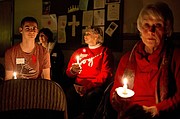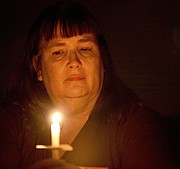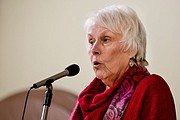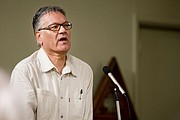Awareness and remembrance
COEUR d'ALENE — Names echoed through the room at St. Luke Episcopal Church in Coeur d'Alene, each of them uttered quietly during a candlelight vigil in remembrance of those lost to AIDS.
More than 50 people were at the church on Tuesday night to participate in an event that focused on awareness and remembrance. The event — which was co-sponsored by the North Idaho AIDS Coalition, Men's Amity Project, and Parents and Friends of Lesbians and Gays Coeur d'Alene — took place on World AIDS Day, a day that since 1988 has been dedicated to raising awareness of the AIDS pandemic caused by the spread of HIV infection, and mourning those who have died of the disease.
"This day is all about getting the word out and honoring the ones that have fought the fight and aren't with us anymore," said Stacie Lechot, executive director of NIAC. "They become a part of us."
Prior to the vigil, two North Idaho residents spoke to attendees about their own experiences with the immune deficiency syndrome. Linda Michal, a recently retired nurse practitioner, gave a historical account of the virus based on her time spent in the medical field.
"In the early part of the epidemic, finding out you were infected really was a death sentence, and a short-term one," Michal said while describing how AIDS was first officially recognized in the 1980s. "That was a very difficult time for people. They were anxious, which was certainly understandable."
People were dying, she added, and the average life expectancy of someone diagnosed with the infection was 12 to 24 months.
But there were several turning points in the battle against AIDS, Michal said. One in particular took place in 1988, when former U.S. Surgeon General C. Everett Koop began advocating for increased public awareness and even mailed every American household information on AIDS.
"It is remarkable to me because he was a devout Baptist who was heavily involved in his church," Michal said. "He said what needed to be done goes beyond that and is the right thing to do and I respect that. He really got a lot of flak from people for advocating preventative measures like condom use."
At the end of her remarks, Michal said all of the medical advancements which help people live with AIDS and HIV worry her because it leads to people neglecting the key component in the fight against the virus — prevention. She said she had lost a number of patients over the years who had become like friends.
"But I've never been a big numbers person," Michal added. "To me the tragedy of it has been the impact on individuals, the impact on families, and the incredible impact of loss that has occurred time and time again."
Kevin Ames, a Coeur d'Alene resident, touched on the emotional impact the illness has had on his life. Ames said his partner, Craig, hid an AIDS diagnosis from him for more than a year.
When he finally learned of his partner's diagnosis, Ames said it felt like he had been dumped into a bucket full of horrors. He watched Craig die, and then went through countless AIDS tests because at the time their accuracy was uncertain, with some false-negative results.
Ames also saw Craig's family, whom he had previously been close with, blame him for Craig's death even though he remained uninfected. Finally, he said he decided to fight back against the burden the stigma of AIDS had placed on him with the truth about the virus and its impact.
"And when you do, people don't like it, they don't like to face that truth," Ames said. "You guys have to be so careful out there. To be sick with something like AIDS, it's different than something like cancer; it has a stigma about it that the community in general doesn't like."









